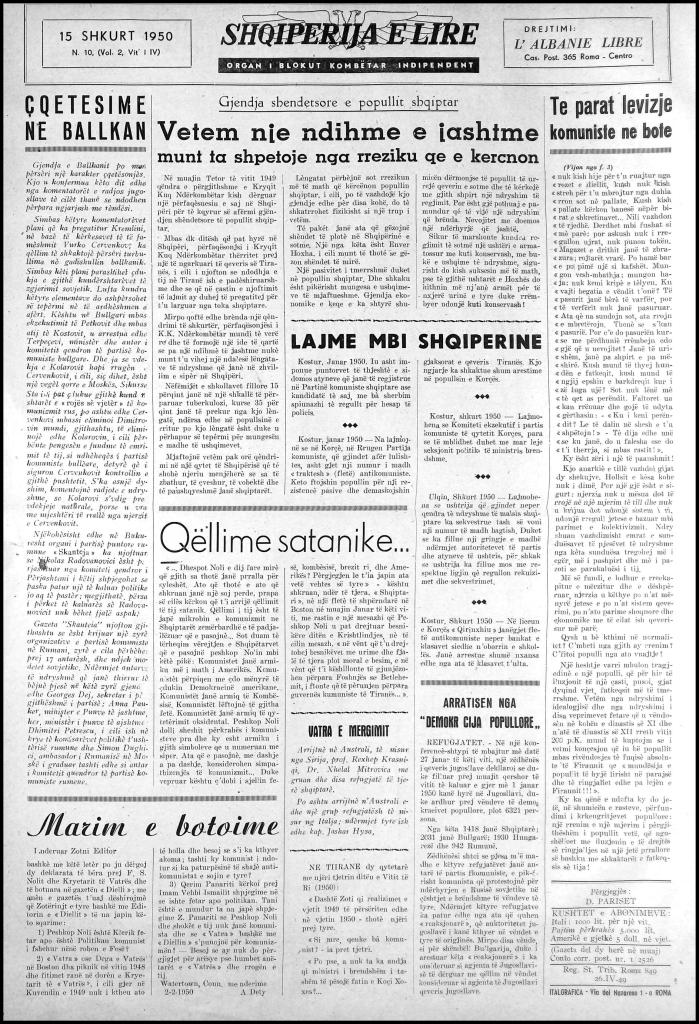
CONFLICT OF INTEREST AROUND ALBANIA-
THE RUSSIANS WOULD HAVE DECIDED TO WITHDRAW FROM ALBANIA?
An interesting article on the Russo-Yugoslav conflict around Albania was published the first of the current month from the Londoner “The Times”.
After highlighting the critical situation in which Albania currently finds itself, both in the economic and political fields, the “Times” continues as follows: “The effects of the hasty integration of the five-year economic plan with the Yugoslavs have caused serious problems in the food sector. Only members of the government, the army and the secret police have adequate food supplies. In almost all cities and villages the state cooperatives control the exchange of all commodities. In theory, every farmer receives a badge which guarantees the types of commodities in exchange for agricultural products. In practice, cooperatives have nothing for sale. Items considered essential for Westerners, such as clothes, shoes, cottons, etc. are nowhere to be found. The ordinary citizen is poorly dressed; he is considered lucky if he possesses a pair of rubber shoes. Farmers find themselves a little better off: they continue, as before, to make their own clothes and shoes.
“The army is composed of 60,000 men, equipped with Italian, German, English and Russian material. The deserters have been numerous during the last months; this is due to the fact that many of them have been in service since 1943. Among the soldiers reigns discontent; the government’s concern in the face of this discontent is shown by the constant changes in commands, as well as by the fact that on more than one occasion, when the government wanted to use force against its opponents, it was the police who intervened instead of the regular army.
“The problem of a market for the sale of oil and other products of the Albanian subsoil is of great importance for the government at this time”. Dealing with relations between Albania on the one hand and the Kominform and Russia on the other, the Times writes: “Despite the repeated requests, Albania has not been admitted as a member of the Kominform; the Soviet Union has not offered Albania any treaty of friendship and mutual assistance. These two facts suggest that the Soviet government does not want to commit in a policy which guarantees assistance to Albania in case of unrest. “
“The threat of Soviet intervention in Albania, at the request of Enver Hoxha, is still sufficient to prevent Tito” writes the “Times”, “however Tito is by no means idle.”
Before concluding, the helpful London newspaper also highlights the negative part played by the Greek government with its policy towards Albania; the claims on Northern Epirus give Enver Hoxha the only point of support which assured the sympathies of the nationalists to his Communist foreign policy.
However, although the “Free Albania” committee hopes for an internal revolt that will overthrow the communist dictatorship and allow the creation of a provisional government, “whatever happens in the future will depend a lot on the conduct of Greece and Yugoslavia”, the article ends .
In recent days there has been talk of a probable withdrawal of the Soviets from Albania, thus renouncing to use the Albanian territory as a center of operations in the Balkans.
According to the diplomatic editor of the “Yorkshire Post”, the Russian decision to withdraw from Albania would be a consequence of the defeat of the Greek guerrillas following which Albania found itself definitively isolated from the rest of the world.
Today everyone agrees that Albania is in a desperate situation. In recent years, after the so-called liberation, Albania had become an integral part of the Yugoslav economy. Following the breakdown of the economic and political ties that united the two countries, Albania was unable to improve its conditions.
The diplomatic editor of the ‘Yorkshire Post’ writes: “In order to avert a complete catastrophe, the Albanian Prime Minister, Hoxha, is now trying to improve economic relations with Italy.”




